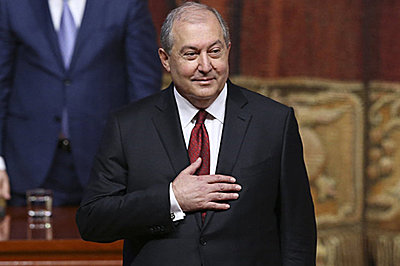Press releases
All people feel their pain, but it is profound and human to feel and share the pain of others. The message of gratitude of the President of the Republic Armen Sarkissian
Dear compatriots of Armenia, Artsakh and the Diaspora,
Dear friends of Armenia and the Armenian people,
On April 24, we paid tribute to the memory of Armenians massacred in the Ottoman Empire more than one hundred years ago: loudly and in a whisper, mentally and in a variety of voices, in Armenian and English, French and Russian, Greek, Arabic, and Hebrew.
The 106th anniversary of the Armenian Genocide proved once again that all people feel their pain, but it is profound and human to feel and share the pain of others; moreover, to have the courage to speak out about it.
Leaders of many countries, governments, and parliaments, public, cultural, scientific, and academic circles, international organizations have already recognized and condemned the Armenian Genocide of 1915. On behalf of my country, Armenia, my people, and myself, I would like to express my thankfulness and gratitude to all of them, to all the peoples who are heartfelt to us.
The international recognition of the Armenian Genocide received a weighty and courageous incentive by April 24 Statement of the US President Joe Biden, whose speech, in fact, reaffirmed the recognition and condemnation of the Armenian Genocide by both chambers of the US Congress two years ago, in 2019. I want to thank the US President and his team once again for being by our side and committed to his election campaign promise.
I am thankful to all our compatriots in the Diaspora, especially Armenian-Americans and the Armenian structures and organizations in the USA, including the Armenian National Committee, the Armenian Assembly of America, the ARF, the ADL and the SDHP, all our churches, the AGBU, all those individuals and national public figures who were unbreakable in their struggle, a struggle that is to be continued yet.
I am grateful to the generations of my compatriots who survived the Armenian Genocide, whose integral part of lives is not only the constant memory of the lost homeland and martyred ancestors but also the just struggle and unquenchable demand, and of course, the belief that the haven of justice is quite near.
I am grateful to all my compatriots in Armenia and Artsakh, state, political and public figures, political forces and non-governmental organizations, intellectuals, all citizens of Armenia: WE REMEMBER AND DEMAND. This proves that in case we are united and organized, we will achieve results.
Pain brings us together, but we must unite first of all in the name of success, as well as in the name of security and interests. National unity and mutual understanding, solidarity and tolerance are the best way to achieve success.
Of course, supporting the attainment of truth and establishment of justice do not imply any expectation of words of gratitude. Just as the official delegations of sixty countries, who arrived in Armenia in 2015, to participate in the events of the 100th anniversary of the Armenian Genocide, did not expect. That day, the RF President Vladimir Putin and President of France Francois Hollande, President of Cyprus Nicos Anastasiades and President of Serbia Tomislav Nikolić, high-ranking delegates from other countries and international organizations were with the Armenian people. Nor did foreign delegations honouring the memory of our canonized martyrs in Tsitsernakaberd this year, including delegations headed by the President of the French Senate and the Speaker of the Central American Parliament, ministers, parliamentarians, and delegates from other countries. Neither do all those who have never stopped fighting for the recognition and condemnation of the Armenian Genocide and against the denial of the Genocide ... I cannot fail to mention President of France Jacques Chirac, under whom a law on the recognition of the Armenian Genocide was passed in France, and President Emanuel Macron, who declared April 24 the National Day of Remembrance of the Armenian Genocide in France, and, of course, the two religious leaders, Pope John Paul II and Pope Francis, who spoke about the deep wound of the Armenian Genocide, which has not healed over one hundred years later.
Each step in condemning and recognizing the Armenian Genocide is a unique signal and warning to all those who are still striving to regulate relations and achieve their goals through force and human rights abuse. Yesterday, it was the Ottoman Empire; today, it is its heir modern Turkey and its "little brother" Azerbaijan. Genocides have no statute of limitations ...
I am confident that our path to a free and independent life is continuous because we can and will overcome the obstacles and challenges along the way, and we will do this with the support of our friends.
